|
|
|
Sort Order |
|
|
|
Items / Page
|
|
|
|
|
|
|
| Srl | Item |
| 1 |
ID:
089772
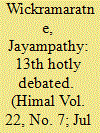

|
|
|
|
|
| Publication |
2009.
|
| Summary/Abstract |
The defeat of the LTTE as a military force has not made the ethnic question in Sri Lanka go away. If anything, the need for political solution has become ever more urgent. The euphoria over the military victory must allow the debate on power sharing and devolution to die. While these discussions take place, it is useful to go back to power-sharing arrangements already in place, and examine where they fall short.
|
|
|
|
|
|
|
|
|
|
|
|
|
|
|
|
| 2 |
ID:
195434


|
|
|
|
|
| Summary/Abstract |
Who has responsibility for addressing the security implications of climate change? States and the United Nations justify their existence on the promise of providing security. Yet, although the national and international security implications of climate change are increasingly acknowledged, incorporation of climate change in national security planning or institutional arrangements is far from universal, while debates in the UN Security Council about its role in addressing climate change have been characterized by contestation. This article examines key debates about the responsibilities these institutions have for providing security in the face of the threats posed by climate change, examining the extent to which these institutions accept responsibility for providing security in these contexts. Drawing on Toni Erskine’s notion of institutional moral agency, the article examines a 2017 inquiry into the national security implications of climate change in Australia, and the September 2021 UN Security Council debate on the international security implications of climate change. These two case studies explicitly focus on the question of institutional responsibility – of the Australian Government and the UN Security Council respectively – for addressing the threat of climate change. In both cases these institutions stop short of accepting responsibility for providing security in the face of climate change, with limited policy responses or institutionalization as the result. With the security implications of climate change increasingly apparent, and increasingly recognized by these (and other) actors, the failure to accept responsibility raises potentially significant questions about the legitimacy of these institutions themselves.
|
|
|
|
|
|
|
|
|
|
|
|
|
|
|
|
| 3 |
ID:
145525
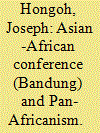

|
|
|
|
|
| Summary/Abstract |
The 1955 Asian-African Conference (Bandung) has been hailed as a turning point in the emergence of the Global South solidarity movement and a pivotal moment in southerners’ collective quest both to liberate themselves from colonialism and to reforge the international order on more inclusive and emancipatory foundations. In this article, the author demonstrates how, in Africa, these aspirations were undermined by nationalist ambitions that privileged self-contained sovereign statehood over potentially more progressive continental solidarity under the Pan-African spirit. The author does so by analysing how the absorption of the Bandung spirit within the Pan-African movement reinforced opportunities for the pursuit of national interests, the affirmation of colonial geographies and economies, and the intensification of forms of solidarities built on the imagined fruits of independence at the expense of a shared history of colonialism. For many African countries, the enduring lessons of the Bandung spirit reside in the challenges of resolving the tensions over the appropriate context for pursuing self-determination and transforming the international order. Thus, while the Bandung spirit delivered the means for newly independent states to engage in international politics through interstate solidarities, it also helped to accelerate the foreclosure of alternative possibilities for intervening in and reshaping the prevailing international order.
|
|
|
|
|
|
|
|
|
|
|
|
|
|
|
|
| 4 |
ID:
180002
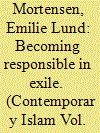

|
|
|
|
|
| Summary/Abstract |
Taking an ethnographic point of departure in the stories of three Syrian middle-class men in Amman, Jordan, in this article, I zoom in on the role of care in the everyday of exile, as I explore the young men’s attempts to be “responsible” young men despite challenging circumstances. Guided by Ahmed’s (2006) notion of lifelines, defined as those which direct us and allow us to find our way (ibid.: 12–14), I demonstrate how gendered norms and notions became objects of reflection and experimentation in exile, both enabling and forcing the young men I worked with to think through other ways of leading life as a man. Finding further inspiration in Naguib’s (2015) and Ghannam’s (2013) works on masculinity and care in the Middle East, I consider care as central to the process of negotiating a masculine identity in general as well as to the reconfiguration of a meaningful masculine position in exile specifically.
|
|
|
|
|
|
|
|
|
|
|
|
|
|
|
|
| 5 |
ID:
175172
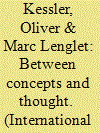

|
|
|
|
|
| Summary/Abstract |
This article advances the argument that the acceleration of practices introduced by digital technologies also impact key concepts of social theory. Digital technologies not only give rise to new concepts, but they also reconfigure our entire socio-political conceptual vocabulary. In particular, this acceleration reorganises the relationship between the spatial and temporal dimensions of political concepts. As a consequence, our spatially defined understanding of authority, hierarchy or relation underestimates the repercussions of shifting temporalities. This article pursues this shift from space to time and outlines how temporal relationality is gradually impacting the representations and images we live by.
|
|
|
|
|
|
|
|
|
|
|
|
|
|
|
|
| 6 |
ID:
090826


|
|
|
|
|
| Publication |
2009.
|
| Summary/Abstract |
Through an examination of Aeschylus' Oresteia, this essay argues for the critical importance of intergenerational justice to democratic theory. It explores the difficulties of democratic responsibility given the tension between necessity and freedom central to questions of intergenerational justice. The essay first details the relevant lacunae in the theories of two major figures of contemporary democratic theory, John Rawls and Jürgen Habermas. It then develops an account of democratic responsibility that acknowledges human freedom to make decisions, even given the necessity created by the fact that individuals and communities inherit their own range of potential actions from previous generations. The essay elaborates this claim by examining how each of the central figures in the Oresteia deals first with the dilemmas inherited from the past and then with new situations engendered by his or her own actions. The essay concludes with a consideration of this aspect of democracy in contemporary political life
|
|
|
|
|
|
|
|
|
|
|
|
|
|
|
|
| 7 |
ID:
171201


|
|
|
|
|
| Summary/Abstract |
In this article, we examine exceptional circumstances in which men who father children born as the result of conflict-related sexual violence assume full or partial responsibility for their child's well-being. Children ‘born of war’ are increasingly recognized as a particular victim group in relevant international policy frameworks. Their social status falls somewhere between the victimization of their mother and perpetration of their father. Given the circumstances of their birth, they often experience social rejection and loss of identity with a long-term impact on their well-being. Previous scholarship has primarily documented the challenges faced by their mothers as caregivers and as victims of wartime sexual violence. A discussion on fathers to children ‘born of war’ is absent, attributable not only to their perpetrator status, but also to the assumption that their identity is unknown or that a relationship between father and child is undesired. The article demonstrates this is not always the case. Based on research in northern Uganda between 2016 and 2019 which included interviews and focus group discussions with former male combatants in the rebel group the Lord's Resistance Army, we explore how some fathers seek to maintain a relationship with children born as the result of ‘forced marriage’ and assume partial or full responsibility for their well-being and care.
|
|
|
|
|
|
|
|
|
|
|
|
|
|
|
|
| 8 |
ID:
129885
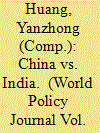

|
|
|
| 9 |
ID:
194775


|
|
|
|
|
| Summary/Abstract |
The period of Donald Trump’s term in office was one of the most contentious periods of American civil–military relations. Both active-duty and retired officers rebuffed and castigated the president’s actions, policies, and character. Such public criticism of a sitting president has no real parallel in American history. This breakdown in civil–military relations was caused by the president’s lack of respect and in fact disdain for the contours of military professionalism. Those contours are expressed by the attributes of expertise, corporateness, and responsibility. The military’s notion of commitment to the Constitution, an apolitical ethos, as well as its willingness to sacrifice for the national good were all part of the military’s own sense of professional values. In this case, the sitting president shared none of those values and tried to politicize the military, ignored their expertise, and disparaged their selfless sacrifice.
|
|
|
|
|
|
|
|
|
|
|
|
|
|
|
|
| 10 |
ID:
179723


|
|
|
|
|
| Summary/Abstract |
This paper provides a review of the recent academic literature on how individual countries or regions can successfully implement unilateral climate policies in an increasingly integrated world economy. It first reviews the theory, empirics and future projections of ‘carbon leakage’, i.e. the notion that more ambitious climate policies will pose an incentive for energy-intensive industries to relocate and thus undo at least some of the achieved emission reductions. It then discusses measures to reduce carbon leakage. These include free allocation of emission permits to firms deemed at risk of carbon leakage, targeted trade policies as well as international cooperation to promote climate policies in third countries. Finally, it provides an overview of the debate on responsibility for trade-related emissions, including production- and consumption-based emission accounting as well as some more recent approaches.
|
|
|
|
|
|
|
|
|
|
|
|
|
|
|
|
| 11 |
ID:
090166
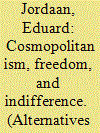

|
|
|
|
|
| Publication |
2009.
|
| Summary/Abstract |
Despite cosmopolitanism's concern for the world's poor and its concomitant heavy moral demands, cosmopolitans establish a limit to the self's responsibility for the global poor. This contrasts with Emmanuel Levinas's view that the self has an infinite responsibility for the other, a responsibility that derives from the self's questioning of the impact of his freedom on others. From a Levinasian perspective, cosmopolitanism's restriction of the self's responsibility for others creates a sphere of rightful indifference to the needs of the other; lends legitimacy to a disregard of the other; forestalls an ethical awakening to the other; constrains the achievement of a more just global order, given that, from a Levinasian perspective, a better justice is built on the self's open-ended responsibility for the other; and points to a tension at the heart of cosmopolitanism, considering the coexistence of elements that both frustrate and aspire to the achievement of global justice. It is concluded that the achievement of cosmopolitanism's goals would require the acceptance of an open-ended responsibility for the other.
|
|
|
|
|
|
|
|
|
|
|
|
|
|
|
|
| 12 |
ID:
111514


|
|
|
|
|
| Publication |
2012.
|
| Summary/Abstract |
This article presents the Indian electricity sector as a case study of the evasion of responsibility in public policy. India's electricity policy repeatedly fails to meet its own targets and is universally lambasted as inadequate. The state appears aware of many of the reasons for these failures, yet policies have consistently failed to make effective corrections. Part of the explanation for this institutional and policy stasis lies in the pervasive shirking of responsibility by actors throughout the electricity sector. The sector is analysed to explore the mechanisms through which responsibility is displaced, deflected or dissipated. These mechanisms include 'agency', 'presentational' and 'policy' strategies, which are both pre-emptively and reactively deployed. Using these strategies, responsibility is shifted through (1) institutional architecture which formally delegates power to other actors, especially exploiting the ambiguity in federalism, sectoralism, privatization and decentralization; (2) rhetorical displacement of blame onto other actors or 'exogenous' factors and (3) everyday policy procedures and bureaucratic practices designed to distance officials from decision making. By negating the requirement for institutional and analytical responsiveness, these evasions of responsibility perpetuate systemic failures and undermine the credibility of the Indian state.
|
|
|
|
|
|
|
|
|
|
|
|
|
|
|
|
| 13 |
ID:
113310


|
|
|
|
|
| Publication |
2012.
|
| Summary/Abstract |
In November 2002, a man with 'atypical pneumonia' treated in Foshan hospital, Guangdong Province, in the People's Republic of China, was the first known case of Severe Acute Respiratory Syndrome (SARS). However, it was not until April 2003 that the Chinese government admitted to the full scale of 'atypical pneumonia' cases infected with SARS, two months after the disease had rapidly spread across the world with initial infections in Hong Kong and Vietnam sourced to Guangdong. In 2008, Zimbabwe experienced one of the biggest outbreaks of cholera ever recorded. By February 2009, the disease had spread across all of Zimbabwe's 10 provinces and to neighbouring countries-Botswana, South Africa, Zambia and Mozambique-causing thousands of infections amongst their populations. This article seeks to examine what duties the Chinese and Zimbabwe states had to protect their citizens and the international community from these outbreaks. The article refers to the findings of the International Law Commission's study into the role of states and international organisations in protecting persons in the event of a disaster to consider whether there is an international duty to protect persons from epidemics. The article concludes that both cases reveal a growing concept of protection that entails an international duty to assist individuals when an affected state proves unwilling or unable to assist its own population in the event of a disease outbreak.
|
|
|
|
|
|
|
|
|
|
|
|
|
|
|
|
| 14 |
ID:
144244
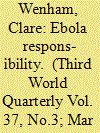

|
|
|
|
|
| Summary/Abstract |
Combating threats of infectious diseases has been increasingly framed as a global shared responsibility for a multi-actor framework of states, international organisations and nongovernmental actors. However, the outbreak of Ebola Virus Disease (EVD) has shown that this governance framework has not been able to limit the spread of this virus, despite the normative and legislative changes to global disease control. By unbundling the concept of responsibility, this article will assess how global shared responsibility may have failed because accountability does not fall on any one state or stakeholder, highlighting an inherent weakness in the global disease governance regime. The paper concludes that a move towards multiple responsibilities may prove a more effective mechanism for ensuring global health security.
|
|
|
|
|
|
|
|
|
|
|
|
|
|
|
|
| 15 |
ID:
122993
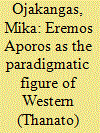

|
|
|
|
|
| Publication |
2013.
|
| Summary/Abstract |
The originary figure of the Western political subject is neither the Aristotelian zoon politikon nor the Agambenian homo sacer but the Socratic eremos aporos. Like the Agambenian homo sacer, the Socratic eremos aporos is abandoned by his fellow citizens, not outside the polis but in the polis, being a refugee in his own city. He lives, as Callicles says of Socrates in Gorgias (486c), "in his city as an absolute outcast." Moreover, like the Agambenian homo sacer, the Socratic eremos aporos also lives in a state close to death-"in a state as close to death as possible," as Socrates says of himself in Phaedo (67d). However, there is a decisive difference between the Agambenian homo sacer and the Socratic eremos aporos. Unlike homo sacer, the Socratic political subject is not abandoned by the sovereign but by himself through his own traumatic self-accusation. Furthermore, although eremos aporos is also a "living corpse," he is not thereby at mercy of the sovereign. On the contrary, it is he who has become sovereign, not because he has somehow managed to sublate his condition as abandoned and forlorn subject, but because this condition is the condition of sovereign freedom. In other words, it is neither his biological life in the order of nature (zoe) nor his form of life in the symbolic order of the polis (bios), not even his exposure to the threat of imminent death (homo sacer), but his symbolic suicide that renders him a sovereign individual subjected to no one. By removing the subject from his proper place in the symbolic order of the polis, such a suicide not only discloses subject's unlimited responsibility but also renders him capable of transcending his limited position as a living being and becoming a thanatopolitical subject of his own biological death. Although such a subject also affirms life, life that is affirmed here is not mere life but sovereign life in the shade of the instinct of death.
|
|
|
|
|
|
|
|
|
|
|
|
|
|
|
|
| 16 |
ID:
105435
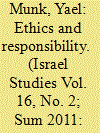

|
|
|
|
|
| Publication |
2011.
|
| Summary/Abstract |
The article characterizes the nature of several recent Israeli documentary productions. Following Levinas's concept of responsibility toward the Other, it reviews the various forms of alterity that seem to dominate today's Israeli documentaries. Beginning with the forgotten Edna Politi's Anou Banou: The Daughters of Utopia (1983), which engaged with the untold memories of the first Zionist women pioneers, it continues with more recent productions, focusing on the increasing number of women filmmakers, who in the past were traditionally voiceless. The article contends that the entrance of women into the traditionally male playground of filmmaking, particularly during the tense political times of the last twenty years, has paved the way for a more sensitive, empathic discourse on Self and Other, a discourse that is no longer limited to women's filmmaking. This new tendency, which can be related to as the "feminization" of the Israeli documentary discourse, criticizes the invisibility of society's weaker subjects and should be interpreted as an appeal for the creation of a new civil order in Israel.
|
|
|
|
|
|
|
|
|
|
|
|
|
|
|
|
| 17 |
ID:
103755
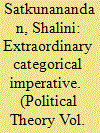

|
|
|
|
|
| Publication |
2011.
|
| Summary/Abstract |
Many political theorists assume that Kant's categorical imperative can only present itself to politics epistemologically-that is, as a test or procedure for acquiring more certain knowledge of duties. This study retrieves the ontological aspect of the categorical imperative by showing that the Groundwork of the Metaphysic of Morals is a conversion narrative. In the Groundwork Kant describes a transformative encounter with the categorical imperative as a principle that discloses our (ordinarily concealed) ontological condition. This encounter opens a new mode of being characterized by the feeling of awe. In its ontological aspect, the categorical imperative discloses human freedom and demands an unflagging thoughtfulness, but offers no material guidance about duties. When understood in both its ontological and epistemological aspects, the categorical imperative offers a rich portrait of human responsibility and can help illuminate the ethical stance appropriate to politics without becoming a standard to be imposed upon politics.
|
|
|
|
|
|
|
|
|
|
|
|
|
|
|
|
| 18 |
ID:
156550


|
|
|
|
|
| Summary/Abstract |
This article looks at how Belarus, the most affected state by the Chernobyl nuclear disaster, discursively constructs cooperation with foreign countries that provide help in combating the consequences of the tragedy. It shows that different representations of foreign actors handling the prolonged consequences of the Chernobyl nuclear disaster contribute to developing new friendships (with Japan), questioning existing cooperation (with Russia), and softening old (with Germany) and current (with Europe) conflicts in Belarus. The article makes a contribution to three debates in identity literature in constructivist International Relations: (a) identity and foreign policy; (b) the ‘voice’ and agency of the ‘Rest’; and (c) identity and difference. It is argued that when small non-Western states (help receivers) construct an ethical identity of bigger Western and non-Western states (help providers), they challenge the existing temporal and spatial identities of old strangers, enemies, and friends and create a new platform for conflict and cooperation.
|
|
|
|
|
|
|
|
|
|
|
|
|
|
|
|
| 19 |
ID:
152743
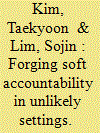

|
|
|
|
|
| Summary/Abstract |
This study sets out to introduce the concept of soft accountability as a new approach to understanding mutual accountability in unlikely settings of development cooperation through South-South cooperation. In doing so, this study analyzes three defining components of accountability (responsibility, answerability, and enforceability) and identifies the actors and modalities of mutual accountability in four different situations of South-South cooperation mechanisms. The main finding in this conceptual analysis contains establishing an institutional and sustainable development platform for the mutual accountability of South-South cooperation by not only reflecting the distinctive nature of South-South cooperation, but also focusing on responsibility first to reduce buck-passing among actors and to sustain its continuous management.
|
|
|
|
|
|
|
|
|
|
|
|
|
|
|
|
| 20 |
ID:
197912


|
|
|
|
|
| Summary/Abstract |
The underrepresentation of women in top leadership positions may result in a potential loss in efficiency. In this study, we examine gender differences in leadership emergence and efficiency when a leadership task is framed as authority or responsibility. In a public good game, the group leader is entitled to punish low contributors among the group members in order to increase the group welfare. The experimental design includes a basic treatment—framing the leader's task as authority or responsibility—in occasions where group leaders emerge through self-promotion or voting. We find a more pronounced framing effect among females compared to males. Although women are generally less willing and less voted to lead than men, the responsibility framing enhances female leaders' effectiveness to a larger extent than male leaders': they contribute more to the public good, and are more inclined to punish low contributors when they are voted as leaders. Therefore, when leadership tasks emphasize responsibility, female leaders could enhance social welfare in the provision of public goods.
|
|
|
|
|
|
|
|
|
|
|
|
|
|
|
|
|
|
|
|
|